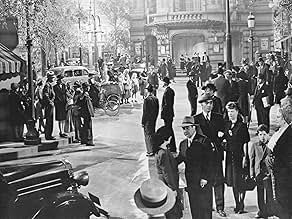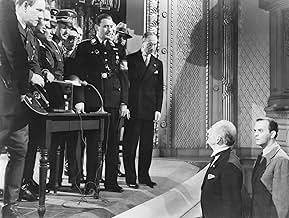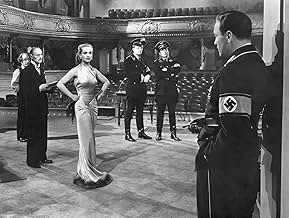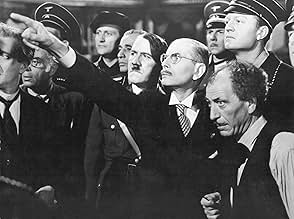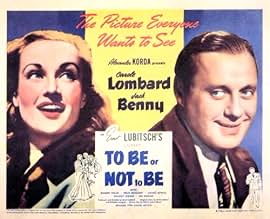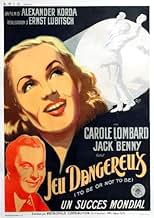Während Polen von den Nazis besetzt ist, versucht eine Theatertruppe einem polnischen Soldaten dabei zu helfen, einen deutschen Spion aufzuspüren.Während Polen von den Nazis besetzt ist, versucht eine Theatertruppe einem polnischen Soldaten dabei zu helfen, einen deutschen Spion aufzuspüren.Während Polen von den Nazis besetzt ist, versucht eine Theatertruppe einem polnischen Soldaten dabei zu helfen, einen deutschen Spion aufzuspüren.
- Regie
- Drehbuch
- Hauptbesetzung
- Für 1 Oscar nominiert
- 5 Gewinne & 2 Nominierungen insgesamt
- Polish RAF Pilot
- (Nicht genannt)
- German Soldier
- (Nicht genannt)
- Member of Audience at Performance of Hamlet
- (Nicht genannt)
Zusammenfassung
Empfohlene Bewertungen
This Hitler, however, turns out to be the actor Bronski (Tom Dugan), a bit-player impersonating the Fuhrer in a play being put on by a Polish theatrical group. Is Hitler "by any chance interested in Mr. Maslowski's delicatessen?" teases the narrator in the opening segment. "That's impossible—he's a vegetarian!" Responding to all the "Heil Hitler" salutes, Bronski asserts "Heil myself" as he walks through an open door. Bronski is playing a secondary role to the famous Polish actor Josef Tura, played by Jack Benny, then a radio star whose trademark straight face and deadpan humor marks the film.
Tura's wife Maria, also a popular Polish actress, is played by Carole Lombard who was to meet a shocking death in a plane crash in January, 1942 shortly after the film was completed. In the film, Maria is two-timing her actor husband by romancing a young flyer Lt. Sobinski (Robert Stack) who falls "head over heels" for the actress. The running gag in the film is that whenever Josef is playing Hamlet and delivers the line, "to be or not to be," it is a signal for Sobinski to get up from his seat in the theater and go backstage to meet Maria in her dressing room. It appears that Tura is more upset about his speech being interrupted than what happens behind the curtain.
The sudden Nazi invasion, however, puts all romantic trysts on the back burner and the mood shifts to solemn. The plot now becomes more involved with espionage and patriotism than acting when Sobinski, now a pilot for the Royal Air Force, discovers that respected Polish professor Siletski (Stanley Ridges) is a double-agent working for the Nazis. When the Lieutenant returns to Warsaw to eliminate the traitorous professor, Maria and Josef team up to help by launching an elaborate charade to trick the unsuspecting Nazis. While the film takes its name from the famous line in Hamlet, Shylock's monologue from the Merchant of Venice, spoken in front of Nazi swastikas, is recited by Jewish actor Felix Bressart, "Have we not eyes? Have we not hands, organs, senses, dimensions, attachments, passions?" he asks the Nazis, "If you poison us, do we not die?"
It is a noteworthy plea for tolerance in the days of rabid anti-Semitism even though the line "Hath not a Jew eyes?" is not spoken. According to Thomas Doherty writing in Tablet magazine, "the word "Jew" was seldom heard on the Hollywood screen, even in war-minded scenarios where the topic of anti-Semitism was front and center." He also quotes film historian Lester D. Friedman saying that "The studio bosses were always—even at this point—afraid of thrusting Jews into the spotlight." Whatever the reason, To Be or Not to Be is marked with the genius of one man, the great Jewish director Ernst Lubitsch who said, "What I have satirized in this picture are the Nazis and their ridiculous ideology," and that the tone and temper of the film "cannot leave any doubt in the spectator's mind what my point of view and attitude are toward these acts of horror."
While the film is a broad and biting satire, from the beginning of production in November 1941 to its completion on December 24th, however, events made sure that To Be or Not to Be, as well as Charles Chaplin's The Great Dictator, was no longer a laughing matter.
Despite having heard it mentioned (and avoided the remake) I had still never seen this film until earlier today. I wasn't sure what to expect as I knew that it had been made during the war and that it's humour might not seem as mocking or sharp today. However I was surprised how funny it actually was while it also dealt with the Nazi issue at the same time. The mocking tone of the film is balanced nicely by a real vein of wit with sharp word play all around. The plot is kept ticking over by this humour until Tura is able to drive the film by his many performances!
The Nazi's are mocked without taking away from the horrors of what they were. The cast are what really makes the film work for me though. Although he takes second billing, I can't help but feel that Benny is the star of the film as he has all the best characters and the lion's share of the lines. Lombard does very well indeed and shows a real ability for quick witty lines the fact that she died in a plane crash leaving this her last movie should be considered a great loss. The whole support cast, whether Polish actor or German commander, all play very well managing to bring both wit and pathos to the film.
Overall a film that is not as uncomfortable to watch as I suspected it might have been, in fact one that is downright hilarious at times and has all the sharpness and wit that I want in a comedy. When Jack Benny says `so they call me Concentration Camp Ehrhardt' for the 5th time, I defy you not to be rolling!
Lubitsch grew up in Berlin and became an acting sensation after World War I before becoming one of the most promising directors of Hollywood. A precocious talent with a sense of sophistication that would be known as the 'Lubitsch touch', he was probably under the influence of that boost of creativity and flamboyance that made Berlin an artistic Mecca in the early 30s (like in Bob Fosse's "Cabaret"). His film opens on Warsaw, a more suitable place for free art once Germany surrendered to swastikas. And as if he anticipated the criticism over his subject, the story features a play named "The Gestapo" and satirizing the Nazis. During a rehearsal, the man playing Hitler (Irish actor Tom Dugan) delivers a hilarious and unexpected "Heil myself". The line gets cut by the director who makes it a matter of ethics not to make Nazis funny, much to the actor's reluctance.
Basically, Lubitsch asks us the question: should we sacrifice a good line for the sake of seeming decency? How many times haven't we felt the necessity to cross the barrier of good taste because it was so tempting. So the line is censored because of the risk of offending Hitler and when the Germans come on a day of September 1939, the play is cancelled once and for all. The situation resonates like Churchill's parable about war and dishonour, fearing the Nazis is the dishonourable attitude, even when meant to play safe, you're never safe with them, so let's just use your best weapon, guns or gags it doesn't matter. While I was wondering if Lubitsch would have been as loose on the Nazis if he knew about the Camps, I was hiding a chuckle because the line "so they call me Concentration Camp Ehrhardt" kept springing to my mind. Should I feel guilty?
No less than for any movie that dared to turn the subject into laughing matter, from Donald Duck's "Der Fuerher's Face" to "La Vita e Bella". It's because Nazis were human that their crimes were horrific, it's because they were human that they should be mocked. Art is the triumph of the intellect over the brutal force, the sensitivity over cynicism, it can be sophisticated and fancy but it can't really do without powerful sentiments, this is why the film makes a good use of Shakespeare's lines (borrowed from "Hamlet" and "The Merchant of Venice") and even more why it focuses on a married couple, the greatest actress of Poland Maria Tura (Carole Lombard) and her hammy husband Joseph (Jack Benny). The film opens with a sort of vaudevillian mood where Maria exploits her husband's "Hamlet" soliloquy to bring the handsome aviator Sobinski (Robert Starck) to her room, the running gag is not overused so Marie doesn't appear too cheap and Joseph too dumb.
There's a fine balance between the romance and the screwball situations and they all get along with the intricacies of a plot that involves a sinister but seductive spy named Professor Siletski (Stanley Ridges), who proposes Maria to become an agent. Meanwhile, the troop must absolutely capture the man, confiscate the documents that contain names of Polish Resistant members and get rid of the spy, and this is where their Nazi costumes get quite handy. So we see Jack benny and all his friends impersonating Nazi officers and even Selitski with variable effects, sometimes with the right timing, sometimes a delay force them to rewrite the script. In a sort of meta-referential nod to his own art, Lubitsch directs actors playing directors, actors and writers, proving that sometimes a good act can be a matter of life and death. Hammy too much and your cover is blown if not your head. Maria proves to be a more restrained actress so she can dodge the Nazis' flair, same can't be said about Joseph and Benny's antics endanger the film's credibility in their exaggerated audacity, the man pushes his luck so often it's a wonder how he did survive.
The film also suffers from a series of contrivances that happen all too conveniently near the end leading to a rushed climax only redeemed by the hilarious ending. Still, the real black spot in the film's legacy is of course the haunting of Carole Lombard's memory. The actress died in a plane crash a few weeks after the film's release, the USA had just entered the war and she was collecting bonds during a tour across America. In a way, she was a victim of that war though she lived far from the ruins and ashes of Poland, her death cut one of the most promising careers short and made Gable so inconsolable he joined the war too... I avoided that film for a long time because of that story, it had saddened me a lot even more because I happen to be afraid of flying.
I couldn't believe how many times she referred to flights during the film, the simple fact that she loved an aviator gives it an eerie feeling, it's just as if the film was doomed to be clouded by tragedy, individual and universal. However, and that might be the secret of "To Be or Not to Be", It's all fiction, it's not reality, the film was criticized when the war was still raging and now it's a classic, once reality is as dead as fiction, what remains is the essence of art.as
When I was 16 (20 years ago, sigh...), this was re-released for a short time in a local art-house cinema, and my father insisted I go watching it with a friend. Well, teenagers don't normally line up to see 50 year old black and white comedies, but - man, was I glad I did!
This is a pitch black comedy that feels as fresh today as it must have then; in fact, this must have been kind of a shock in 1942. There are no cheesy clean characters or cringe-worthy lines: this is a firework of fast, witty dialogue with an edge and the sexiest, cleverest (and most morally ambiguous) female protagonist I have ever seen in a film before the "New Hollywod" era.
Even the structure and the way the story evolves are very modern; there are flashbacks and twists and turns that might be very common in contemporary films but must have seemed almost "avant-garde" at the time.
The biggest fun, of course, is how Lubitsch takes the pi** out of Hitler's blind, fanatic followers. I don't believe the Nazis have ever been mocked better than in this comedy masterpiece (and I only hope old Adolf has seen it, too). Mel Brooks' remake is not bad, but the original is simply killer.
See it, and then see it again (and again).
Priceless. 10 out of 10
Favorite films: http://www.IMDb.com/list/mkjOKvqlSBs/
Lesser-known Masterpieces: http://www.imdb.com/list/ls070242495/
Favorite Low-Budget and B-Movies: http://www.imdb.com/list/ls054808375/
Favorite TV-Shows reviewed: http://www.imdb.com/list/ls075552387/
Wusstest du schon
- WissenswertesWhen Jack Benny's father went to see this movie, he was outraged at the sight of his son in a Nazi uniform in the first scene and even stormed out of the theater. Jack convinced his father that it was satire, and he agreed to sit through all of it. His father ended up loving the film so much he saw it forty-six times.
- PatzerAlthough having Maria Tura give the cue line "To be or not to be" to the men in the audience she wishes to meet in her dressing room is a very funny premise of the film, it actually would be highly impractical for Maria to think she would have time to meet backstage. Hamlet's "To be or not to be" soliloquy is only about 3-4 minutes long and Ophelia has the very next line in the play (in fact Hamlet announces her entrance at the end of his soliloquy), which would barely give Maria any time to meet men in her dressing room.
- Zitate
Joseph Tura: [disguised as Professor Siletsky - speaking about Maria Tura] Her husband is that great, great Polish actor, Josef Tura. You've probably heard of him.
Colonel Ehrhardt: Oh, yes. As a matter of fact I saw him on the stage when I was in Warsaw once before the war.
Joseph Tura: Really?
Colonel Ehrhardt: What he did to Shakespeare we are now doing to Poland.
- Alternative VersionenIn Poland, a brief introduction was edited in. Polish actor Kazimierz Rudzki assured the audience that the movie was done with best intentions by their "American friends". At the time the movie screened in Poland, many people still lived in trauma from the events of World War II; few could find comedy in the German invasion of Poland, instead finding the movie in poor taste, offensive, or hard to swallow.
- VerbindungenFeatured in Showbiz Goes to War (1982)
- SoundtracksPolonaise in A major, Op. 40, No. 1, 'Military'
(1838) (uncredited)
Written by Frédéric Chopin
Orchestral arrangement by Aleksandr Glazunov
Heard during the opening and closing credits
Top-Auswahl
- How long is To Be or Not to Be?Powered by Alexa
Details
Box Office
- Bruttoertrag in den USA und Kanada
- 3.270.000 $
- Weltweiter Bruttoertrag
- 4.578.000 $
- Laufzeit1 Stunde 39 Minuten
- Farbe
- Seitenverhältnis
- 1.37 : 1
Zu dieser Seite beitragen


